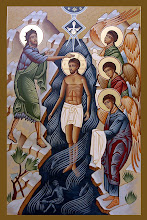I thought I had predestination figured out, at least as was humanly possible. It wasn't until I spoke with my Orthodox friend who had issues with how we as Lutherans speak of predestination until I noticed a word that, to the best of my knowledge, Luther skips over in his Lectures on the Catholic Epistles. It is also glossed over and skimped on in exegetical explanation that I have seen very few people mention it.
McG (the Orthodox friend who used to be LCMS) said that the Orthodox concept of predestination is that God predestined in eternity those who would be elect on the basis of foreknowledge of perseverance in faith until the end. I was shocked...for I thought that election was based upon grace and done without foreknowledge....until I was reading both St. Peter and St. Paul on the subject.
St. Paul says in Romans 8:29-30, "For those whom he foreknew he also predestined to be conformed to the image of his Son, in order that he might be the firstborn among many brothers. And those whom he predestined he also called, and those whom he called he also justified, and those whom he justified he also glorified."
St. Peter says in 1 Peter 1:1-2, "Peter, an apostle of Jesus Christ, to those who are elect exiles of the dispersion in Pontus, Galatia, Cappadocia, Asia, and Bithynia, according to the foreknowledge of God the Father, in the sanctification of the Spirit, for obedience to Jesus Christ and for sprinkling with his blood:"
In both passages election is not treated as some divine decree in eternity by a Sovereign God who wants all to be saved, but only elects to save a few. To me that still made our view of God the Calvinist view of God, but without simply saying Limited Atonement and Double Predestination......simply to be nicer.
But these passages brought about several questions: God's election is based upon foreknowledge of individuals (at the least, something about them) as the passages clearly say. Therefore, what is being or why are some foreknown within the context of predestination? The Formula of Concord on this subject simply says that God elects to salvation, that both foreknowledge and predestination are "separate," and that God's foreknowledge is over the lost and the saved.....fair enough, but that doesn't answer my question.
Could the Orthodox position actually be accurate? I have been reading (trying) a paper by Robert Preus on the view of election by Lutheran dogmaticians during the period of Lutheran Orthodoxy, and I must admit I still don't see what our Synod's view on this is. Is it accurate to say that God's election is based upon foreknowledge of perseverance (hence, non-rejection) of the Gospel by man? This still puts the blame of damnation on man and the glory of salvation on God.
I would greatly like some help on this matter as it is bugging me quite a bit. Is God detached from those whom He predestines to salvation as our usually worded answer seems to suggest? Or is God truly a God who elects for Christ's sake and is consistent with His ultimate will in all of man's salvation?



